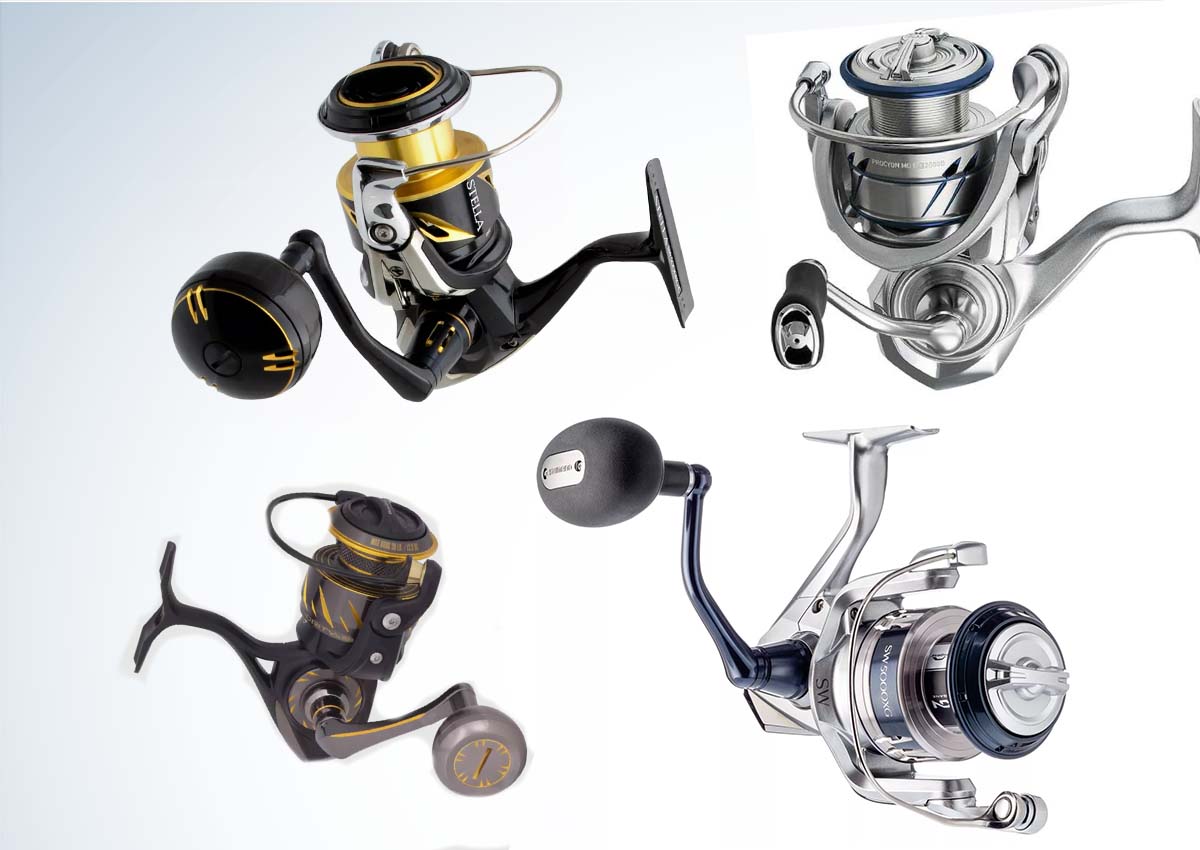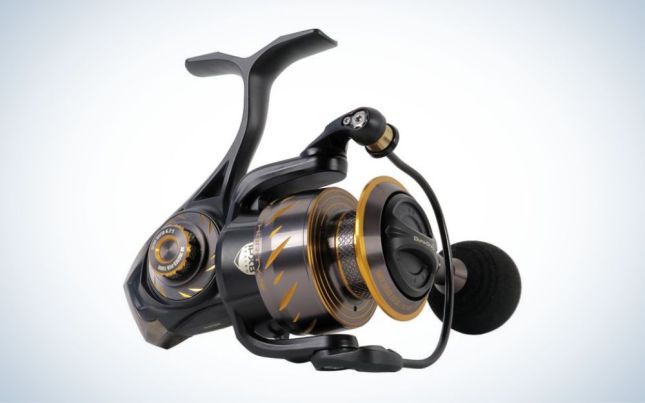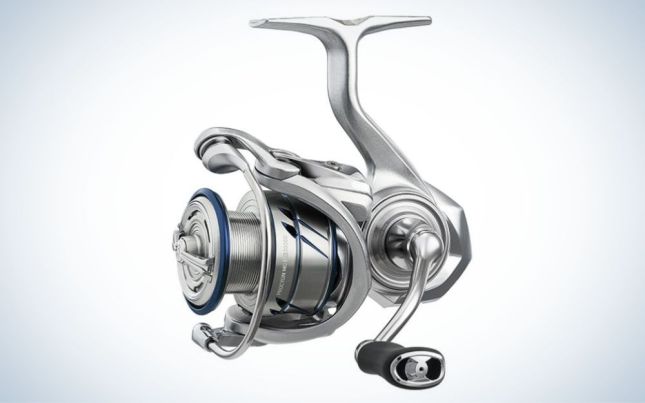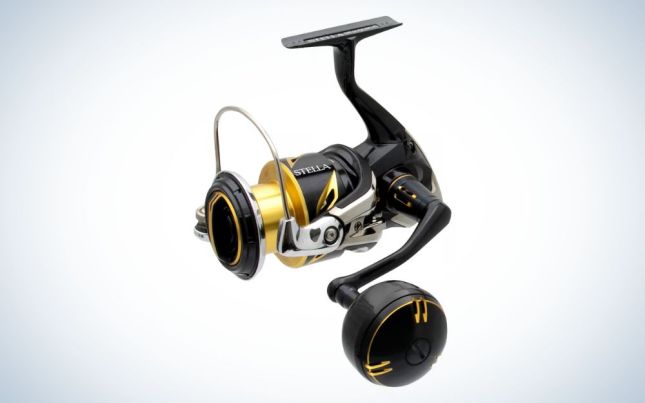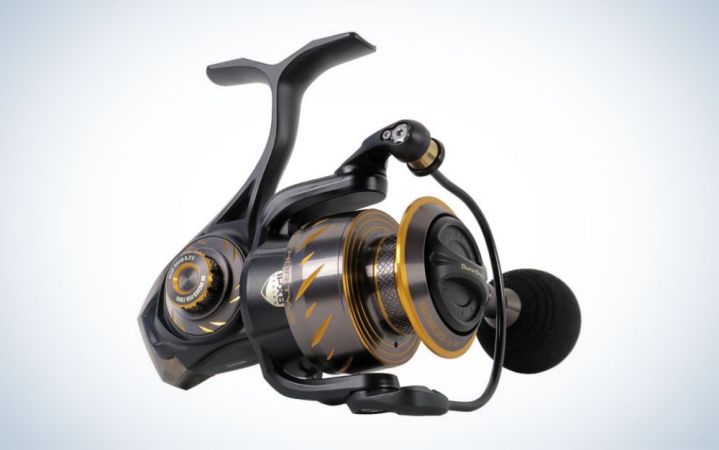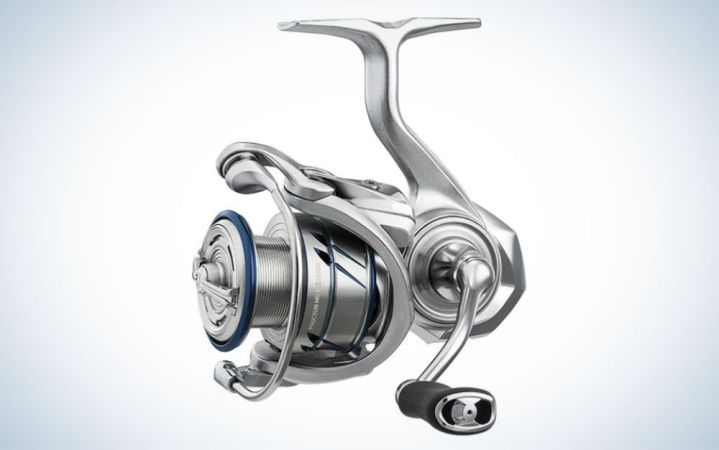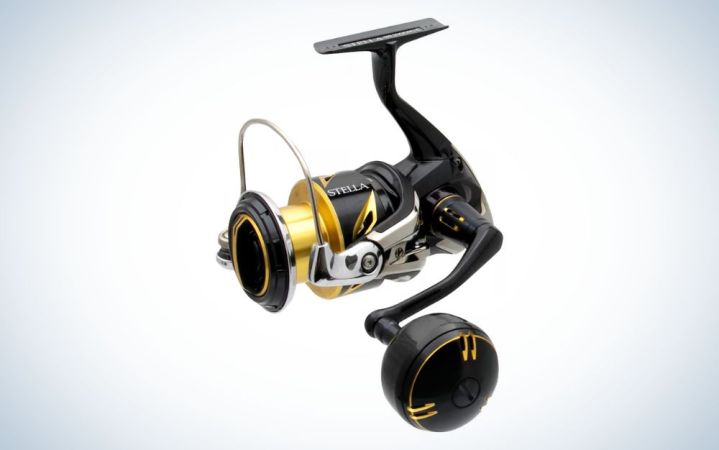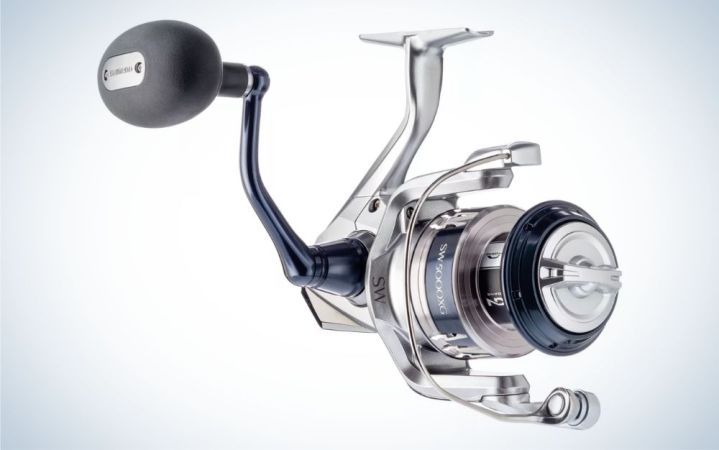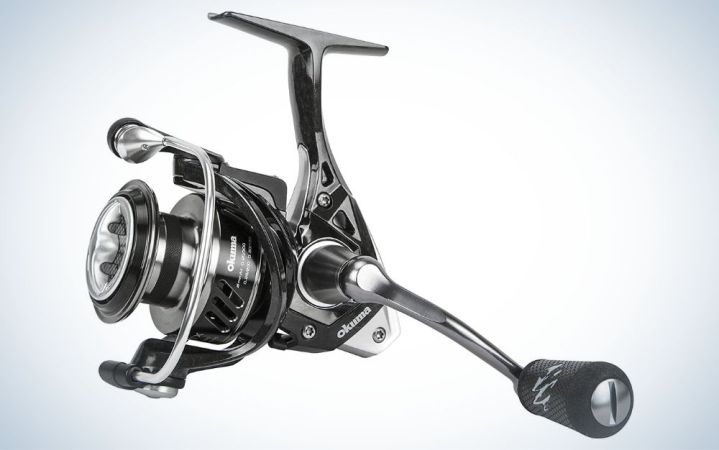We may earn revenue from the products available on this page and participate in affiliate programs. Learn More ›
Saltwater and freshwater spinning reels are a breed apart. To survive the demands of offshore, inshore, and backwater fishing, a saltwater spinning reel has to be tough and powerful while maintaining the highest performance.
So, how are saltwater spinning reels different from freshwater spinning reels? To slow the effects of salt and sand, modern saltwater spinning reels are waterproof with corrosion-resistant components. Inside the reel, precision gears and a reinforced shaft allow the reel’s advanced drag systems to apply maximum pressure. Somehow, all this strength and power is housed in a compact body that shaves every possible ounce. To target the biggest fish in the world, the best saltwater spinning reels use advanced technology and engineering to balance comfort, power, and reliability.
- Best Overall: PENN Authority
- Best Lightweight: Daiwa Procyon MQ LT
- Best Heavy Duty: Shimano Stella SW
- Best Inshore: Shimano Saragosa SW
- Best for the Money: Okuma ITX
How We Picked the Best Saltwater Spinning Reels
To award the best saltwater spinning reels, I set high expectations. I started with the reel’s construction, looking for water-resistant seals and corrosion-resistant components. After exposure to salt water, a crappy spinning reel will quickly corrode. Bearings and joints seize. The reel handle, bail and line guide are subject to failure. But a tough reel shouldn’t be a heavy reel. Today’s reels use advanced alloys and smart design to cut weight and reduce the size. A spinning reel hangs below the rod, so it’s a real drag to swing a heavy and awkward reel all day. Spinning reels offer some advantages when fighting a big fish. To understand the advantage, imagine carrying a five-gallon bucket of water with the bucket handle. Then, imagine balancing the bucket of water on your palm like carrying a platter of food. Using a spinning reel to fight a big fish is like carrying the bucket with the handle, the downward force is applied to the reel hanging below the rod. With a casting reel, I have to balance the reel against the pull of the fish, like carrying the bucket on my palm. To pick the best saltwater spinning reel, I looked for features to back up the reel’s fighting advantage. Heavy, water-resistant drag, strong and stiff body, high-power handle, and sturdy bail are required to beat a big fish with a spinning reel. One thing I didn’t limit is price. To meet the needs of big game anglers, a spinning reel requires every advanced technology available. The ultimate test of a heavy-duty spinning reel is casting topwater lures to bluefin tuna. I have seen spinning reels break, seize up and melt. Only the best heavy-duty spinning reel for saltwater survive the rigors of big game fishing. But even inshore anglers need a high-quality reel. Catching a dozen big red drum in one day or fighting and landing a dozen 50-pound cobia will put the hurt on an inadequate spinning reel.
Best Overall: PENN Authority
Why It Made The Cut
A new super reel from one of the oldest names in saltwater tackle, the PENN Authority, takes the company’s reputation to the next level.
Key Features
- Weight: 5500 at 15 ounces
- Drag: 5500 at 30 pounds
- Line capacity: 5500 at 320 yards of 10-pound monofilament
Pros
- Sealed body
- Stainless steel gears
- Carbon fiber drag
Cons
- Expensive
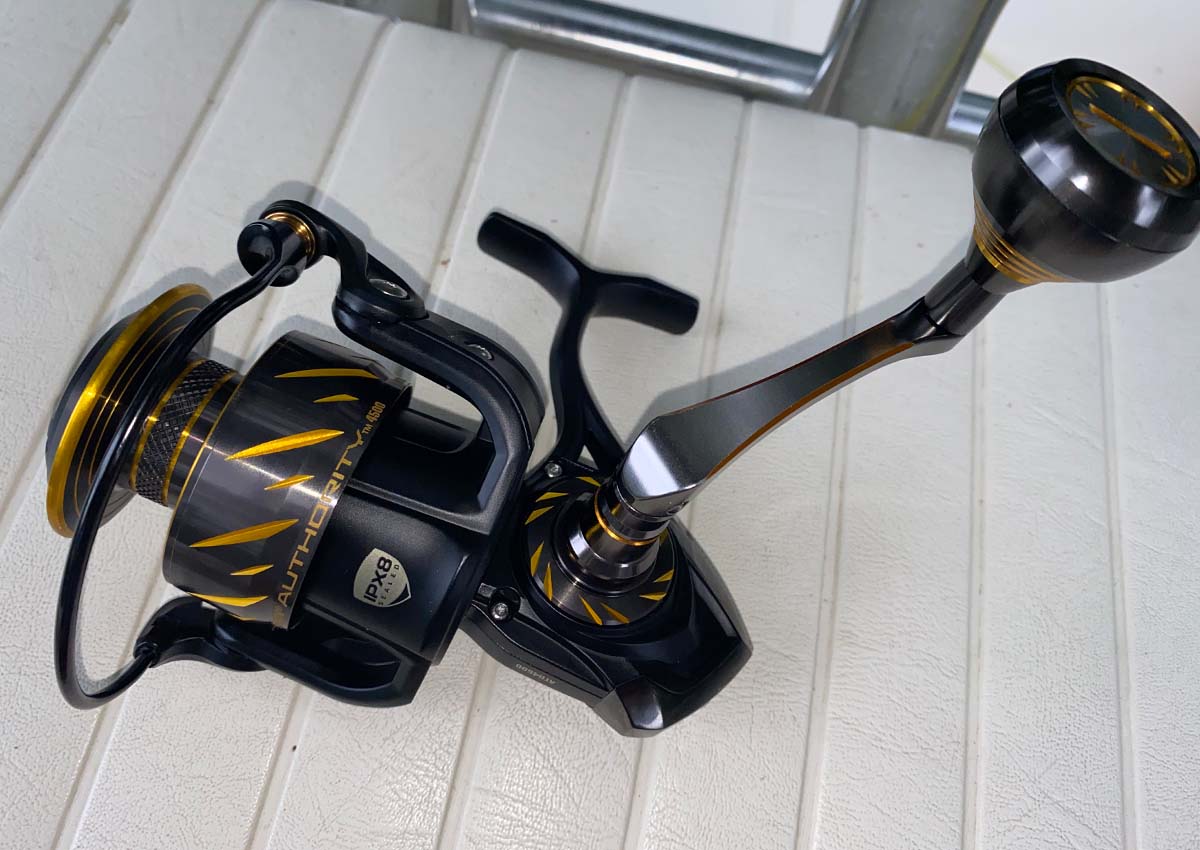
The authority on saltwater tackle, PENN, appropriately called their new reel the Authority. PENN threw all of their most advanced technologies at this new introduction, including PENN’s carbon fiber drag, super slow oscillation, and metal body. To move the Authority to the top of the line, they added a sealed, IPX8 waterproof body protecting stainless steel gears and reinforced shaft. To cut weight, the body, rotor, bail and handle are machined aluminum. On the water, the Authority shows a big fish who is the boss. The carbon fiber drag reduces heat to stay smooth through long runs and long fights. When the tide turns, and I gain line on a fish, the gears and shaft connect to gain line under pressure. Most importantly, the full metal construction assures the reel stays together no matter how hard a fish tries to pull it apart. Whether I’m backing down on a white marlin or wading into the surf, I’m not worried about dunking the Authority in the water and dragging the reel through the sand. Anglers who demand the most out of their tackle refuse to be let down by an inferior reel. Above all, the PENN Authority is built to be reliable at the highest level of the sport.
Best Lightweight: Daiwa Procyon MQ LT
Why It Made The Cut
Light and tough, with advanced technology in a small package makes Daiwa Procyon MQ LT ready for hardcore inshore fishing.
Key Features
- Weight: 2500 at 6.9 ounces
- Drag: 2500 at 22 pounds
- Line Capacity: 2500 at 210 yards of 10-pound monofilament
Pros
- Compact body
- 6+1 ball bearings
- Lightweight bail and rotor
Cons
- Corrosion resistance
Daiwa always offers unique solutions to common challenges. For example, to make their Procyon MQ LT the best light saltwater spinning reel without sacrificing strength, Daiwa used a single-piece body that reduces flex and makes the reel water resistant. The design allows the Procyon MQ LT to house larger gears in a smaller body for more power. Anglers finesse fishing inshore for redfish, striped bass, speckled trout, and bass need a light spinning reel with plenty of power. The Procyon MQ LT comes in sizes down to 1000 yet still maintains 11 pounds of drag. The Procyon MQ LT uses a hollow metal bail and shaved rotor to reduce rotating weight. I was thankful for that feature as I made hundreds of casts for speckled trout and striped bass. For a small reel, the Procyon MQ LT is tough enough to go deep in the mud, salt, and sand to chase my favorite inshore fish.
Best Heavy Duty: Shimano Stella SW
Best Heavy Duty
Why It Made The Cut
The industry standard for big game saltwater spinning reels, Shimano’s Stella SW is the pro’s choice for taming giants.
Key Features
- Weight: 5000 at 14.8 ounces
- Drag: 5000 at 29 pounds
- Line Capacity: 5000 at 240 yards of 10-pound monofilament
Pros
- Water-resistant drag
- IPX8 waterproof body
- Rigid gears and handle
Cons
- Very expensive
When the best anglers in the world target big bluefin tuna, giant trevally, sailfish and wahoo they use Shimano’s Stella spinning reels. That’s because no other spinning reel has proved more reliable. Throwing topwater lures to the world’s toughest fish requires a spinning reel that makes a long cast and produces incredible power. The Stella incorporates Shimano’s best technology to make the heavy-duty reel lightweight and powerful. To land an accurate cast in front of feeding fish, the bail uses a super slow oscillation that layers the line for least friction. The lip of the bail is shaped to further reduce friction for maximum casting distance. A one-piece, air-light bail reduces rotating weight on the big reel. A full metal body houses corrosion-resistant bearings supporting cold-forged gears and a machined shaft. To back up the sturdy gears and shaft, the Stellas star is an advanced drag system that is waterproof and dissipates heat for the smoothest release of line while maintaining maximum pressure. There are plenty of worthy heavy-duty spinning reels at the tackle shop, but Shimano’s Stella is the most popular big-game reel on the water for one reason: reliability.
Best Inshore: Shimano Saragosa SW
Best Inshore
Why It Made The Cut
Dependable value and precision power make the Shimano Saragosa SW a popular choice for inshore anglers.
Key Features
- Weight: 5000 at 16 ounces
- Drag: 5000 at 22 pounds
- Line Capacity: 5000 at 195 yards of 12-pound monofilament
Pros
- Water-resistant carbon fiber drag
- Reinforced gears and shaft
- Sealed bearings
Cons
- Limited sizes
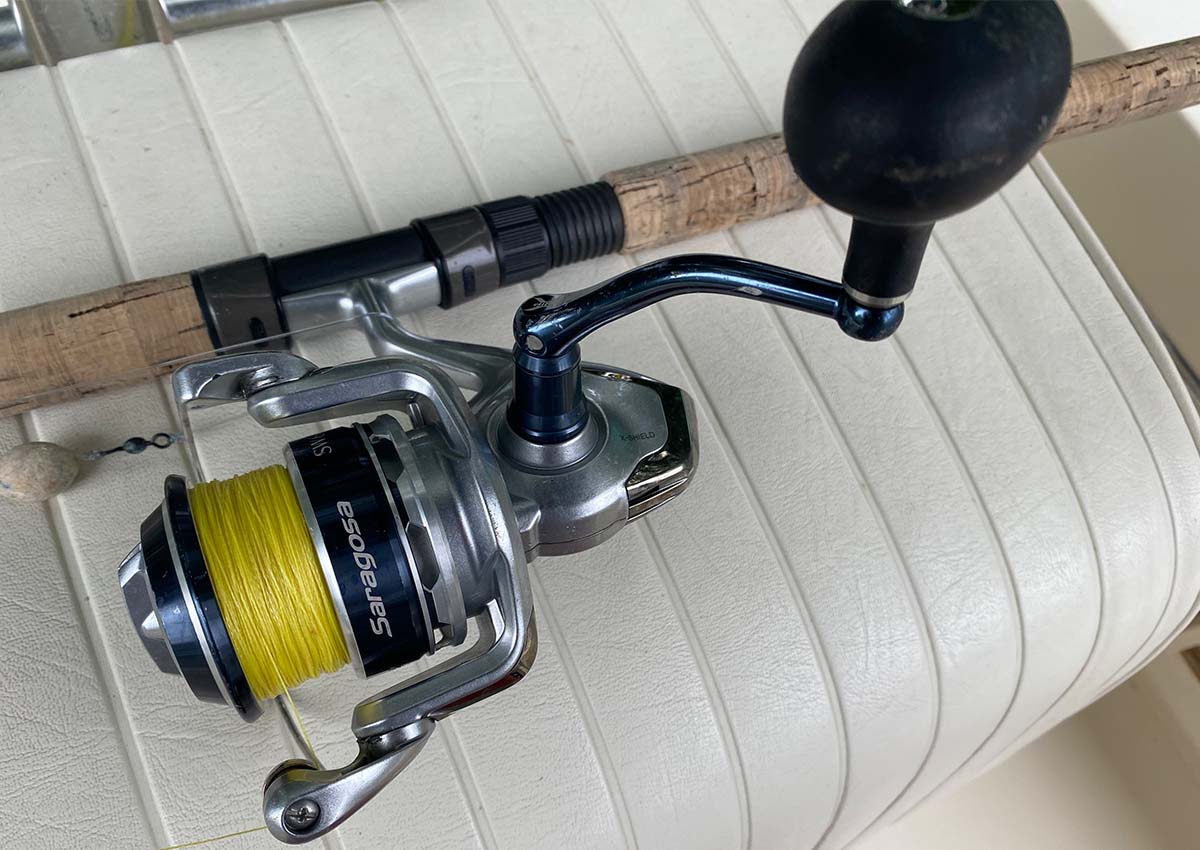
When I’m casting lures or live bait to cobia, red drum, and striped bass, my Saragosa SW is the best inshore saltwater spinning reel for the task. The Saragosa SW incorporates some of Shimano’s best technology at an affordable price. The reel is certified IPX8 waterproof to keep salt and sand out of the super-tough cold-forged gears. The pinion gear is supported on both ends with ball bearings assuring the reel handle smoothly turns the bail under great pressure. The water-resistant carbon fiber drag handles high temperatures without breaking down. A spinning reel is best for casting light lures or live baits. I can throw an eel to a passing cobia or pitch a topwater popper to striped bass hiding in the rocks with perfect control and quick response. Then, when the fish turns to run, the Saragosa’s smooth drag and sturdy body combine for exceptional cranking power. My Saragosa SW has caught hundreds of big cobia and red drum, and it continues to perform just as good as the day I bought it.
Another great inshore reel option is the Shimano Stradic FL. Read a full review of the Stradic FL here.
Best for the Money: Okuma ITX
Best Saltwater Spinning Reel for the Money
Why It Made The Cut
Loaded with features and light on price, the Okuma ITX is a great value for a reliable spinning reel.
Key Features
- Weight: 2500 at 8.3 ounces
- Drag: 2500 at 18 pounds
- Line Capacity: 2500 at 165 yards of 8-pound test
Pros
- Great value
- Lightweight carbon side plates
- Sturdy anti-reverse
Cons
- Carbon fiber sideplats
Light and tough, the Okuma ITX includes many of the features in more expensive reels for less than $150. To cut cost and weight, Okuma uses high-tech carbon fiber in the side plates and rotor. Inside, the reel boasts seven ball bearings and a ball bearing in the handle. The rotor is designed to improve air and water flow keeping the reel turning smoothly and cutting weight. The weight savings add up when using the Okuma ITX for finesse fishing flounder, bass, redfish, and trout. The ITX allows me to work the lure with careful action. When I set the hook, the ITX’s reliable anti-reverse immediately throws on the brakes. Light reels still have to stop a heavy fish, and the ITX uses stacked carbon fiber drag washers protected by a water-resistant gasket to slow a speeding redfish or leaping speckled trout. The Okuma ITX is the best saltwater spinning reel for the money, with features found on more expensive reels.
Things to Consider Before Buying a Saltwater Spinning Reel
To target the biggest fish, you need a reel up to the task. Bluefin tuna, bull red drum, yellow tail, amberjack, trophy striped bass, and billfish will destroy an unworthy spinning reel.
Tackling the angriest fish in the sea requires every advantage. The best saltwater spinning reel has a strong drag system and tough components to back it up. No one wants to fish with a coffee grinder, a saltwater spinning reel cuts ounces and inches while maintaining strength and reliability. It doesn’t take a rocket scientist to know the corrosive combination of salt and metal will eat a reel for breakfast. The best saltwater spinning reels use advanced alloys and smart designs to fight rust and gunk. Today’s saltwater spinning reels look and perform like their freshwater cousins, but they have an extra added layer of toughness for big water fishing.
Strength
Some people are not going to like what I say, but a five-pound redfish would pull a five-pound largemouth backwards. Saltwater fish are stronger than freshwater fish. So the best saltwater fishing rods must be stronger, too.
Using water-resistant carbon fiber washers, even the smaller reels in our review dish out an amazing amount of drag. Carbon fiber drag washers dissipate heat faster to keep the disks spinning smoothly. Overheating causes the washers to expand and create inconsistent drag pressure.
Drag pressure is also affected by water and dirt. The saltwater reels use gaskets and tight tolerances to keep moisture and grit out of the system.
Supporting a strong drag and further preventing corrosion, a saltwater spinning reel is reinforced and water resistant. It’s easy to increase strength with a big and heavy reel, but the best reels are compact and light.
The reels in our review use a carefully engineered frame that cuts material and maintains rigidity. The side plates are made of aluminum or reinforced carbon fiber, and the spool and bail are sturdy metal that is shaved and ported to reduce rotating weight. The reel handle is the Achilles heel on any spinning reel. To crank on a big fish, a metal handle with a sealed ball bearing keeps on rolling. Good saltwater spinning reels are certified waterproof with seals and gaskets to keep out saltwater and dirt.
Inside, the gears and shaft are precision cut or cold forged to mesh perfectly for greater power and less wear and tear. Sealed, corrosion-resistant ball bearings assure that moving parts move correctly. All components are reinforced and supported to prevent any flex in the works.
The top spinning reels use the most advanced technology and smartest design to battle against the rigors of saltwater fishing. Salt, sand and moisture will quickly destroy lesser reels. When you head to the marsh, beach or ocean, leave your bass fishing reels behind.
FAQs
The reels in this review run between $139 to over $800. At the low end of the range, the Okuma ITX cuts cost and weight with reinforced carbon fiber side plates. On the high end of the range, the PENN Authority and Shimano Stella use full-metal construction, reinforced components, and IPX8 waterproofing. Great reels are tough, but they are also precision machines. Using advanced alloys and smart engineering, these high-dollar reels maintain tight tolerances even under intense pressure of a speeding redfish or diving tuna. Corrosion-resistant materials and bulletproof design make a saltwater spinning reel more expensive than a freshwater reel. But the money buys a better reel that will last for years of hard use.
Smart anglers ask the question: how do I clean my spinning reel after saltwater use? Regular maintenance is half the battle in protecting saltwater spinning reels from the elements. The reels in this review use corrosion-resistant components protected by waterproof seals, but they still need TLC to extend their useful life. Spinning reels are especially prone to corrosion because the spool, bail, and body are three separate parts. This allows water and dirt to enter the reel. After each use:
1. Rinse the reel with low-pressure fresh water.
2. Shake the reel to knock out excess water, loosen the drag and dry the reel with a chamois towel.
3. After two or three trips, take the reel apart and use a microfiber towel to wipe away excess salt and grime.
4. Follow manufacturer recommendations for greasing the reel and other maintenance.
Keeping the reel clean and dry allows the best saltwater spinning reels to live a long life.
So, what is the difference between saltwater spinning reels and freshwater spinning reels? The biggest difference is corrosion resistance. Freshwater reels do not have to live up to the same standards as saltwater reels. Water and metal do not mix. Salt speeds up the rate of corrosion. Most good saltwater spinning reels use corrosion-resistant materials and sealed components to fight the corrosive effects of salt and grime. Beefing up a reel for saltwater use makes it heavier than a freshwater reel. But the top saltwater spinning reels cut ounces while maintaining rigidity and strength. Of course, the next question is: are saltwater spinning reels more expensive than freshwater reels? The answer is yes. Advanced technology and high-tech alloys drive up the price of a saltwater reel. Still, there are options for great saltwater spinning reels within anyone’s budget. And, investing in a high-tech spinning reel is always less expensive than replacing a cheaper reel.
Why Trust Outdoor Life
Since 1898, OL has been a leading authority in testing and reviewing hunting gear, fishing tackle, guns and shooting equipment, and much more. We have more than a century-long history of evaluating products, and we’re now bringing that expertise to online reviews. Our editors are experienced outdoorsmen and women, and most importantly, we’re trained journalists. We prioritize field testing and objective data when reviewing products. We conduct interviews with gear manufacturers and engineers as well as outdoor experts so that our readers have an understanding of how and why a product works—or doesn’t.
Advertising does not influence our gear reviews and it never will. While we always focus our coverage on standout products—because we want our readers to be aware of the latest and greatest gear—we also cover the flaws and quirks of any given product.
Final Thoughts on the Best Saltwater Spinning Reels
I fish in one of the toughest saltwater fisheries where I battle large red fish, cobia, and striped bass on spinning tackle. I’ve never regretted investing in the best saltwater spinning reels I could afford and I suggest all anglers do the same. A good reel will last you for years and won’t let you down when the fish of a lifetime grabs your line.
- Best Overall: PENN Authority
- Best Lightweight: Daiwa Procyon MQ LT
- Best Heavy Duty: Shimano Stella SW
- Best Inshore: Shimano Saragosa SW
- Best for the Money: Okuma ITX
